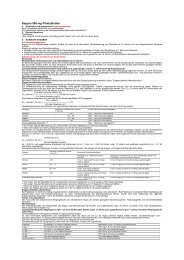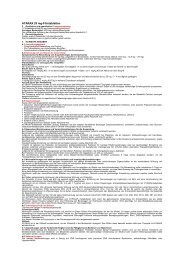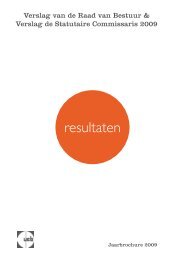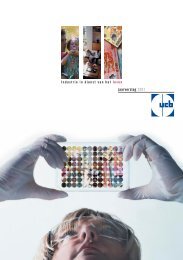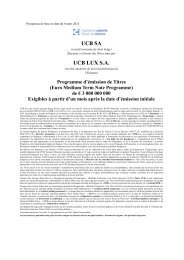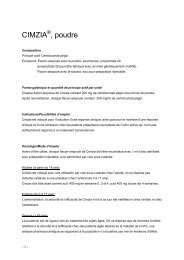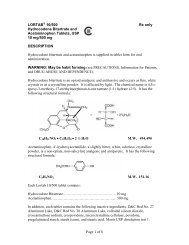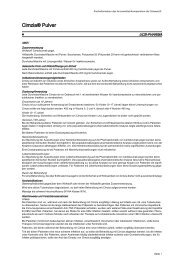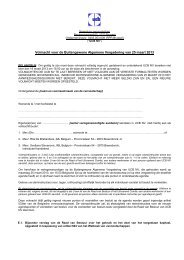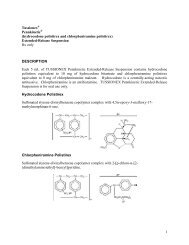UCB SA - BNP Paribas Fortis
UCB SA - BNP Paribas Fortis
UCB SA - BNP Paribas Fortis
Create successful ePaper yourself
Turn your PDF publications into a flip-book with our unique Google optimized e-Paper software.
If any of the <strong>UCB</strong> Group’s major products were to become subject to problems such as loss of patent<br />
protection, changes in prescription growth rates, material product liability litigation, unexpected side<br />
effects, manufacturing difficulties, regulatory proceedings and actions, significant product recalls, major<br />
changes in healthcare structures, publicity affecting doctor or patient confidence or pressure from<br />
existing competitive products, changes in labelling or if a new, more effective treatment should be<br />
introduced, the adverse impact on the <strong>UCB</strong> Group’s revenues could be significant. In addition, the<br />
<strong>UCB</strong> Group’s revenues could be significantly impacted by the timing and rate of commercial<br />
acceptance of key new products including Cimzia®, Neupro® and Vimpat®.<br />
(d) There are risks associated with the technical and clinical development of products of the <strong>UCB</strong><br />
Group.<br />
The development of pharmaceuticals carries significant risk, and failure may occur at any stage during<br />
development due to quality, safety or clinical efficacy issues. After marketing approvals have been<br />
received, safety issues which may not have surfaced in the comparably small patient populations studied<br />
during clinical trials can result in label restrictions and, in the worst case, to the withdrawal of the drug<br />
from the market. All drug candidates of the <strong>UCB</strong> Group will need extensive quality, pre-clinical and<br />
clinical testing before an application can be made for market authorisation from regulatory authorities.<br />
It cannot be predicted with certainty if or when the <strong>UCB</strong> Group will be able to submit an application to<br />
the regulatory authorities of the relevant markets.<br />
Each individual development step is associated with the risk of failure, hence an early stage drug<br />
candidate carries a considerably higher accumulated risk of failure than a later stage candidate, but the<br />
risk nonetheless is high even at the latest stage. The statistical chance of success is increasing as drug<br />
candidates progress successfully through the different phases of drug development. It is probable that<br />
not all the programmes in the pipeline of the <strong>UCB</strong> Group will succeed.<br />
Human clinical trials are very expensive and difficult to design and implement, in part because such<br />
trials are subject to rigorous regulatory requirements. Clinical trials are also very time consuming and<br />
can take several years to complete for each product candidate. Failure can occur at any stage of the<br />
trials and problems may be encountered that would cause the <strong>UCB</strong> Group to interrupt, abandon or<br />
repeat clinical trials. The commencement and completion of clinical trials may be delayed or hindered<br />
by several factors, including but not limited to:<br />
• difficulties in obtaining regulatory and/or ethics committee approval of the study protocol;<br />
• fewer than the projected number of suitable investigators, which will result in delayed<br />
recruitment of the required number of patients;<br />
• unexpected safety and tolerability issues;<br />
• issues with identifying the appropriate therapeutic dosage range;<br />
• unexpected issues with respect to the supply of investigational products; and<br />
• unfavourable benefit/risk ratio due to safety data collected in the course of clinical<br />
development.<br />
Every clinical trial requires a pre-specified objective and clearly defined primary goal. The hypothesis<br />
which is to be tested in the clinical trial may be proven wrong. This will result in a negative study<br />
outcome. Clinical studies which have not met their primary goal are usually not suitable to support a<br />
regulatory submission. If clinical trials for a drug candidate should be unsuccessful, the <strong>UCB</strong> Group<br />
A11250830/2.25/23 Oct 2009 17



